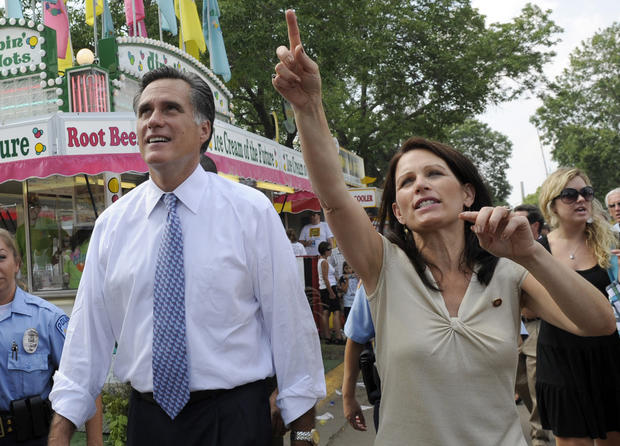Republican presidential hopefuls play down social issues
Former New York City Mayor Rudy Giuliani, who is considering another presidential run, urged Republicans on Sunday "to get the heck out of people's bedrooms and let these things get decided by states."
"We'd be a much more successful political party if we stuck to our economic, conservative roots," Giuliani told CNN.
At least as far as the 2012 GOP presidential candidates are concerned, however, Giuliani needn't have bothered with the warning.
Guided by polls that show that Americans' top concern by far is jobs at the economy, as well as pressure from the Tea Party to focus on the debt and deficit, the Republican candidates have thus far largely tiptoed around divisive social issues. It's a far cry from 2004, when then-President George W. Bush, seeking a second term, loudly backed a constitutional amendment outlawing same-sex marriage.
Exhibit A: Minnesota Rep. Michele Bachmann. Opposition to same-sex marriage was central to the political rise of the ostensible social conservative flamethrower; in 2004 she called it "the biggest issue that will impact our state and our nation in the last, at least, 30 years." Bachmann has suggested nearly all gay people were abused, cast homosexuality as a choice and deemed it "personal slavery" and "part of Satan."
But Bachmann has repeatedly declined to answer questions about her beliefs on gay rightssince becoming a presidential candidate, opting instead to focus on fiscal issues. While she has made token gestures toward social conservatives - signing, for example, a controversial "values" pledgeopposing same-sex marriage and pornography - she has not sought to spotlight those beliefs. In her first debate, Bachmann even stumbled over the question of a federal marriage amendment, first saying she doesn't "see that it's the role of a president to go into states and interfere with their state laws" before later clarifying support for a federal amendment.
She's not alone. Consider Mitt Romney, who shifted right on both gay rights and abortion between his time as Massachusetts governor and his 2008 presidential campaign. Romney, who is casting himself as the candidate to get the struggling economy back on track, has also kept the focus squarely on fiscal issues in the current campaign; not coincidentally, he refused to sign the "values" pledge. Romney backs a constitutional amendment to ban same-sex marriage, but you would hardly know it: He only talks about the issue when forced to do so.
Tim Pawlenty, Jon Huntsman, Herman Cain and most of the other GOP candidates also declined to sign the "values" amendment. Only Rick Santorum, perhaps the only candidate running a campaign geared primarily toward social conservative voters, joined Bachmann in signing on. It's not that the other candidates want to alienate social conservatives - Romney, Pawlenty and Cain released statements stressing their social-conservative credentials even as they vowed not to sign the pledge. But they also don't want to be seen as focused on them, since polls show social issues are relatively unimportant (and potentially alienating) to most voters.
All this doesn't mean that social issues are receding entirely from the political landscape. Social conservative leaders have been pressuring the candidates to pay more attention to their issues, and any candidate who wants to compete in Iowa - the key first-in-the-nation voting state where 60 percent of 2008 GOP caucus-goers identified as born-again Christian - has to spend some time showing up their social conservative credentials. And among rank-and-file lawmakers on the right, abortion, at least, remains potent: House Republicans pushed abortion legislation as one of their first acts after they took over Congress.
But for Republican candidates for national political office in 2012, social issues have thus far been something to play down, not play up. That's partly a function of shifting social mores, particularly on gay rights issues. But it's mostly a function of the economic landscape. With the recovery sputtering and unemployment over 9 percent, most Americans aren't looking for a president to fight the divisive social issue battles of the past. What they are seeking instead is someone who can help them put food on the table in the future.
